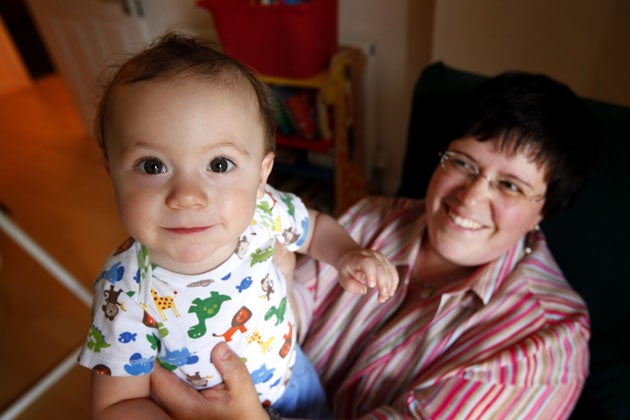Two mothers in three 'fear stares if they breastfeed'
Parliament to debate change in the law to support nursing mothers

Your support helps us to tell the story
From reproductive rights to climate change to Big Tech, The Independent is on the ground when the story is developing. Whether it's investigating the financials of Elon Musk's pro-Trump PAC or producing our latest documentary, 'The A Word', which shines a light on the American women fighting for reproductive rights, we know how important it is to parse out the facts from the messaging.
At such a critical moment in US history, we need reporters on the ground. Your donation allows us to keep sending journalists to speak to both sides of the story.
The Independent is trusted by Americans across the entire political spectrum. And unlike many other quality news outlets, we choose not to lock Americans out of our reporting and analysis with paywalls. We believe quality journalism should be available to everyone, paid for by those who can afford it.
Your support makes all the difference.It is as near to the elixir of life as a liquid can get, especially for a newborn baby. But children are still being denied breastmilk by new mums who are too self-conscious to nurse on the go for fear of attracting the opprobrium of a "bottle-fed" nation, according to a new survey that deals a fresh blow to Britain's attempts to improve its pitiful track record on breastfeeding.
Despite decades of initiatives to persuade mothers that "breast is best", most still prefer using infant formula milk because they believe society at large is anti-breastfeeding, a poll for Mother & Baby magazine has found. The survey comes on the eve of World Breastfeeding Week as the Government debates whether to introduce legislation protecting a mother's right to breastfeed.
Nearly two in three mothers believe the UK is "not breastfeeding-friendly", prompting concerns from nursing mums that they would struggle to breastfeed while out and about. Miranda Levy, Mother & Baby's editor, said: "Every mum we questioned understood the health benefits of breastfeeding, but a huge percentage were put off even trying because of the fear of people staring."
She added that many of the 1,200 readers surveyed cited stressful breastfeeding experiences, with one commenting that she was even asked to be more discreet at a "mums and tots" group because the lady running the group had her husband there.
Although the World Health Organisation recommends mothers exclusively breastfeed their babies until they are six months old, barely a third of British babies are still exclusively breastfed at one week and just one-fifth still are by six weeks. By the time babies are four months old, that figure has plunged to 7 per cent, giving Britain one of the worst breastfeeding records in the developed world.
In a first for a mainstream UK publication, Mother & Baby's August cover will feature a nursing mum. In the US, the style tome W showed Angelina Jolie nursing her twins last autumn.
Rosie Dodds, of the National Childbirth Trust (NCT), which helped to conduct the poll, said: "Most women stop breastfeeding because they lack support." The NCT is launching a national drive to promote nursing-friendly venues, although campaigners believes women should feel comfortable breastfeeding anywhere.
Michelle Atkin, who set up Little Angels to promote breastfeeding, thinks that "we see breasts primarily as sexual, and to use them for anything else confuses people".
Ilana King, a counsellor for the Association of Breastfeeding Mothers, said: "If we saw more women out and about breastfeeding then more mums would start but we live in a bottle-feeding culture." A mother of three, including 11-month-old Saul, she said it tended to be the older generation who cast disapproving looks.
The issue of breastfeeding opened up a split during discussions of the Government's controversial Equality Bill, which is going through Parliament. The proposals would enshrine mothers' rights to breastfeed babies aged six months and under in public places, including shops and cafes, granting them legal protection against overzealous staff who fear they would embarrass other customers.
Join our commenting forum
Join thought-provoking conversations, follow other Independent readers and see their replies
Comments